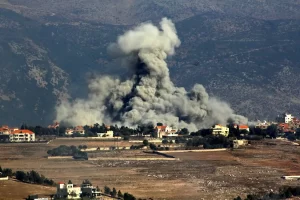Frankfurt, Paris (18/8 – 62.50)
Ukraine has scored a series of victories in more than a week since launching a lightning offensive into Russian territory. Now the stakes are rising as its forces prepare to defend their gains and Russia begins to regain its footing.
Last week, Ukraine deployed thousands of troops to the Kursk region in western Russia, removing Russian flags from captured towns and taking the initiative from Moscow for the first time in months. On Wednesday, officials in Kyiv said Ukraine would use seized Russian territory as a “buffer zone” to shield its north from Russian strikes.
Panic spread quickly among local Russian residents in the early hours of the assault, despite repeated attempts by authorities to assure them that everything was under control, according to a timeline by Reuters of the first two days of the incursion.
Oleksandr Syrskyi, head of the Ukrainian armed forces, said on Thursday that Kyiv had set up a military commandant’s office in the occupied part of Kursk, suggesting ambitions to dig in. The occupied area exceeds 1,150 sq km, Syrskyi said.
Ukraine’s goals at Kursk include diverting Russian forces from the Donbas region of eastern Ukraine, where Russia has been making advances for months and is trying to seize the entire region, said Ukraine’s former defense minister, Andriy Zagorodnyuk. In addition to dealing a reputational blow to President Vladimir Putin, the largest invasion of Russia since World War II has decimated Russian forces, captured bargaining chips, and created a threat to Russia’s flank.
However, a Ukrainian foreign ministry spokesman said that Ukraine was “not interested” in permanently taking Russian land and that the territory was intended only as a bargaining chip in peace talks.
Kyiv-based military analyst Serhiy Zgurets predicted that Ukraine would try to maintain control of the area between the towns of Rylsk, Korenevoye, and Sudzha and the border, which gives Ukraine control of a strip about 20 km (12 miles) wide strip of Russian territory. “This line is not difficult to defend, given there are few roads and a large number of rivers,” he said, as quoted by Reuters.
Ukraine’s forces destroyed eight Russian attack drones and five out of eight missiles, Ukraine’s Air Force chief said on Sunday. As a result of the anti-aircraft combat, anti-aircraft missile troops of the Air Force, mobile firing groups of the Ukrainian Defence Forces, and electronic warfare units shot down 13 air targets in Kyiv, Sumy, and Poltava regions.
Ukrainian President Volodymyr Zelenskyy confirmed that the operation to strengthen Ukrainian troops in Kursk, Russia, on Saturday (08/17/2024), went according to plan. He referred to Syrsky’s report, which mentioned the strengthening of Ukrainian troops’ positions in the Kursk region and the expansion of the controlled territory steadily. This is also related to the capture of Russian soldiers who will be used for future prisoner exchanges.
“I thank all the soldiers and commanders who are taking Russian soldiers. Thus, the release of our soldiers and civilians held by Russia is getting closer,” Zelensky said.
Meanwhile, to win the war over Ukraine, Russia has increased its propaganda budget in 2024 by 20% from its already massive $1.6 billion. Russian economists have been at the forefront of internet disinformation since at least 2014 when it pioneered the use of bot farms to spread fake news about its invasion of Crimea. The Kremlin is at it again, according to French authorities.
Viginum, the France’s foreign-disinformation watchdog, says it has detected preparations for a large disinformation campaign in France, Germany, Poland, and other European countries. The uncovering of a Russian network of 193 websites designed to spread “deceptive or false” content about the war in Ukraine, comes after a series of destabilization efforts that French authorities have attributed to Moscow.
The network, codenamed “Portal Kombat,” also targeted Germany, Poland, and France, which are thought as particular targets as the European Parliament elections draw nearer.






































